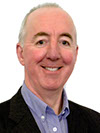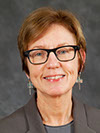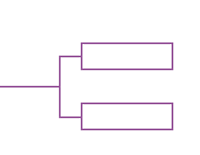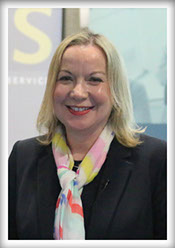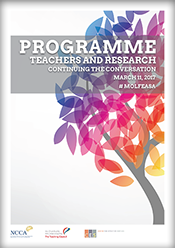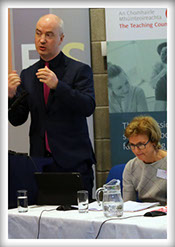
Teachers and Research
Continuing the conversation
March 11th 2017
Mary Immaculate College, Limerick

Video Message from the NCCA, CES and Teaching Council

Keynote [ Video ]
Dr. Carol Campbell
Teachers Leading Education Improvement
Mobility knowledge of, by and for the learning profession
Bio
Dr. Carol Campbell is Associate Professor of Leadership and Educational Change and Director of the Knowledge Network for Applied Education Research (KNAER) Secretariat at the Ontario Institute for Studies in Education (OISE), University of Toronto.
She is an appointed Education Advisor to the Premier and the Minister of Education in Ontario, a member of the International Council of Education Advisers to the First Minister and Deputy First Minister in Scotland, and a member of the Wales Education Commission. More<link to full bio that continues below>
Carol is known for her commitment to combining evidence from professional knowledge and research to develop professional capacity for educational improvement. Her current work includes a focus on supporting teachers’ professional learning and leadership, and on knowledge mobilization for educational improvement.
She is the lead researcher and author of a recent study of The State of Educators’ Professional Learning in Canada (Learning Forward). She is engaged in longitudinal research for Ontario’s Teacher Learning and Leadership Program, which informed her recent co-authored book Teacher Learning and Leadership: Of, By and For Teachers (Routledge). Her forthcoming books are Empowering Educators in Canada and Empowered Educators: How High-Performing Systems Shape Teaching Quality Around the World (Jossey-Bass). Carol’s previous roles include: Executive Director of the Stanford Center for Opportunity Policy in Education (SCOPE) at Stanford University, USA; progressively senior roles in the Ontario Ministry of Education, including being appointed the first Chief Research Officer; and academic, education and policy roles in the UK. Originally from Scotland, Carol completed her doctorate at the University of Strathclyde. She is an active social media contributor on Twitter @CarolCampbell4
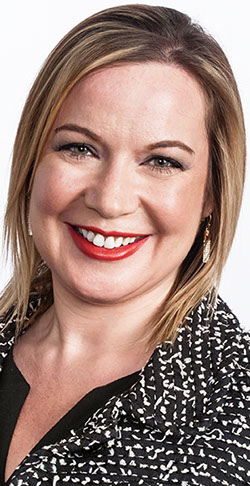

Four parallel workshops offering energising and interactive inputs for attendees.

Providing an interactive opportunity for delegates to hear from teachers involved in research.
The back-story and rationale behind
this shared learning day
A lively panel discussion on the opportunities for strengthening research in education
Themed Workshops
1. Planning and structuring your research
2. Sharing research (including some contributors talking about getting your research published?)
3. Building and sustaining a research culture in schools
4. Funding research
These will be parallel workshops of 45 minutes in length each. Spaces are limited for workshops. Conference attendees will be sent a booking link before the conference to choose the workshop they wish to attend.
Presenters in these workshops will include:
Dr. Jones Irwin, Dr. Zita Lysaght, Research Expertise Exchange group (REX),
Prof. Paul Conway, Dr. Aisling Leavy, Prof. Ciaran Sugrue.
You will need to book your place at these workshops.
Registered Attendees will be emailed booking instructions in advance of the event.

Researchmeet
This element of the Shared Learning Day will be modelled on the highly successful Teachmeet format. It will provide an interactive opportunity for delegates to hear from teachers who have completed, or are engaged in research on a range of topics, as well as those who are engaged with research, through Research Engagement Groups, school-based Academic Councils, professional learning communities, journal clubs etc.,
Each Researchmeet will begin with a series of nano-presentations (5 minutes maximum), whereby teachers/researchers will present on their chosen topic, the findings of research, and the impact of the research on their practice. The goal is to enable and support professional learning amongst peers, informed by teachers’ research. For this reason, after the presentations, time is allowed for attendees to mix informally with each other and the presenters to find out more about the research that interests them the most.
The criteria for inclusion in the Researchmeet are:
1. Relevance – applications should demonstrate that the topic they wish to talk about is of relevance and interest to teachers and other researchers.
2. Accessibility – applications should demonstrate the potential to convey the key learnings in a way that is accessible to participants on the day.
3. Variety – in making the final selection of presentations for the Researchmeet, consideration will be given to ensuring a variety of topics as well as research approach/methodology.
Submissions which meet the above criteria, and are based on a collaborative approach to engagement in or with research, would be particularly welcome.
It is anticipated that the majority of presenters on the day will be practising registered teachers or student teachers who are currently engaged in research as part of their initial teacher education programme. Researchers who are engaged in relevant research or have completed relevant research are welcome to apply to present, and especially so if the presentation is made jointly with a practising teacher who is/was also involved in the research.
If you are interested in presenting as part of one of the parallel Researchmeets, please complete the short questionnaire here.
Future Directions panel discussion
Opportunities for strengthening research in education
A lively panel discussion consisting of Dr. Carol Campbell, Prof. Mark Morgan, teachers and policy makers and chaired by Tomás Ó Ruairc (Director of the Teaching Council). The panel will reflect on the events and conversations of the day and discuss where the future of research with, for and by teachers may take us.
.
About
Since 2013, we have been working closely together to enhance the connections between research, policy and practice for teaching and learning. In May 2013, we hosted a conference for teachers and researchers to commence a conversation that would support this work. A number of significant developments have occurred since then. We wish to continue and enhance these conversations at a Shared Learning Day in March.
This event seeks to provide support for those teacher researchers actively engaged in research and represents a great opportunity to share their experiences with each other and other researchers. It will:
• be a celebration of the ongoing research in teaching and learning
• encourage further critical engagement with research
• act as a catalyst for aspiring teacher-researchers who are seeking collegial and practical support and guidance.
• bring together teachers, researchers and other stakeholders to discuss and explore teachers’ experience of; engagement with; and access to educational research.
The theme for the day will be outlined by Dr. Carol Campbell in her keynote address, Teachers Leading Education Improvement: Mobility knowledge of, by and for the learning profession.
This will be followed by four themed workshops on
• Planning and structuring your research
• Sharing research (including some contributors talking about getting your research published?)
• Building and sustaining a research culture in schools
• Funding research
In the afternoon, there will be an opportunity for delegates to attend parallel Researchmeets. These are modelled on the highly successful Teachmeet format, and provide an opportunity for delegates to hear from teachers who have completed, or are engaged in, or with, research on a range of topics. Each Researchmeet will begin with a series of nano-presentations (5 minutes maximum), whereby teachers will present on their chosen topic, the findings of research, and the impact of the research on their practice. The goal is to enable and support professional learning amongst peers, informed by teachers’ research. For this reason, after the presentations, time is allowed for attendees to mix informally with each other and the presenters to find out more about the research that interests them the most.
There will be many opportunities for networking and engagement throughout the event.
